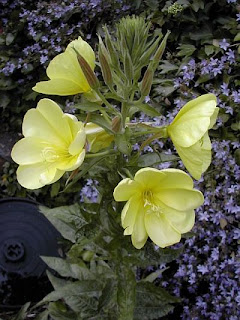I’d just like us to think for a moment what a weed really is. The dictionary says that a weed is an unwanted plant. But there’s more too weeds than just rejection.
There is defiantly a bit of horticultural snobbery about weeds, because they are easy to grow, don’t show enough of the gardeners growing skills. It’s true that most plants that we consider to be weeds are quick and vigorous growers, that freely self seed and on occasions they grow to the determent of other plants around them, such as bindweed, which as its name suggests, grows very quickly up the stems of other plants and strangles the life out of them.
Have you ever bought a plant from the garden centre that grows so vigorously it’s as if it wants to take over the garden and next doors as well? I remember hearing people say that they have a plant that grows like a weed, or they advise others in the garden centre that the plant they are selecting will grow like a weed. Of course this phrase is meant to be negative of the plant. Yet when you think about it, ‘weeds’ are super evolved and well developed plants that have adapted perfectly to suit its environment. Not only are they vigorous growers but they also are very good at seeding themselves. So why is it then that we don’t want to grow these sorts of plants in our gardens and flowerbeds?
Imagine a tub of confined bindweed growing up a wigwam of canes, their beautiful white trumpets nodding in the summer breeze. They wouldn’t look so much like weeds then would they? They would happily brighten up a dark corner of the patio. And evening primroses are so pretty with their big yellow blousy blooms, which flower for a considerably long time because the flowers open in rings up the stem. As one set of blooms dies the next open. And thistles, big daisies and teasels, can you not see a place for these in amongst your more formally accepted plants?
The really great thing about growing weeds for your garden is that the seeds are free. Simply take a walk down the canal, or along a country lane and look out for weeds that you find attractive, and collect their seeds into a paper bag. You will need to take a pencil with you so you can write down the name of the seeds on the bag. If you don’t know what it’s called you could simply write a description of the mother plant or draw it.
When you get home fill a pot with compost and plant your seeds and water them in well. Being weeds, you are sure to soon see seedlings because, well, they grow like weeds, and they have very successful propagation rates. When the seedlings are big enough to handle, re-pot them on and treat them regular plants.
Weeds shouldn’t be confined to only the ‘nature’ area of the garden, they can have a beauty all of their own, and they are exceptionally hardy. And it wasn’t so very long a go that planting grass in the flower bed sounded absurd, and now it’s the norm to grow ornamental grasses; and now its time to liberate weeds and to accept them into our hearts and gardens, and enjoy them.
skip to main |
skip to sidebar
Tea Cosy Folk

Hand made tea cosies, Exclusive designs ~ The perfect gift
Tea Cosies with Character
www.TeaCosyFolk.co.uk
Do you enjoy arts and crafts? Do you friends and family often find you busy crafting? Well this is possibly the blog for you, crammed full of arts and craft ideas for the garden, home and family. You'll always be busy crafting now!
Quick Craft Links:
Search This Blog
TeaCosyFolk.co.uk

Hand made tea cosies, Exclusive designs ~ The perfect gift
Tea Cosies with Character
www.TeaCosyFolk.co.uk



